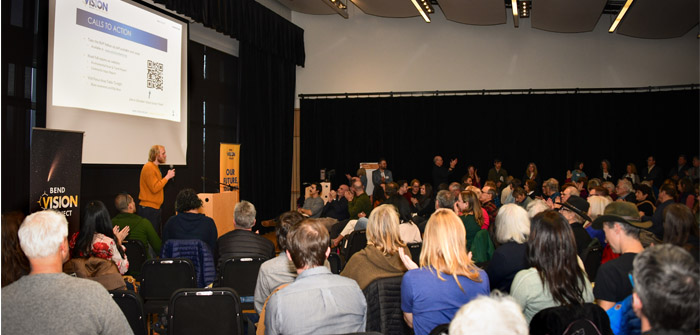(Photo by Kendall Brobst Schiff)
Envision Bend is a nonprofit organization that was founded in 2005 under the previous title of Bend 2030. Newly rebranded, Envision Bend exists to bring together a diverse group of individuals from a wide range of industries and backgrounds, all united with a common goal: to set forth an action plan that will help shape our community in ways that benefit us all.
Through previous action plans, Envision Bend has played a key role in the development of the Greater Bend area. For example, the nonprofit has helped the town reach the goals of constructing a new university campus, a regional transit system, a more diversified economy, more accessible trail systems and more.
On Tuesday, February 7, Envision Bend held a community summit in Wille Hall at Central Oregon Community College. At this summit, a vision for the future of Bend was shared with the public, and guests were encouraged to ask questions, provide feedback and participate in the planning of Bend’s future.
The presentation began in an expansive classroom with views of mountain peaks in the background. As guests filled the room, they were greeted by free food and even free beer, courtesy of Deschutes Brewing. Guests found their seats and watched a slideshow of Bend through the years, going so far back as to show pictures of a historic downtown with dirt roads and population signs that were under 10,000.
Board president David White and board member Kelly Cannon-Miller kicked off the talk by going over Envision Bend’s method of collecting information. The nonprofit used 2,045 surveys, 72 interviews and 17 focus groups/workshops to gather information regarding what Bend values as a community and what direction the community should take for the future.
Overall, Bendites value the natural environment, including parks, trails, clean air and clean water. A collective sense of community and friendliness was also high on the list, along with economic opportunities, a family-friendly atmosphere, promoting racial and cultural diversity and supporting Bend’s education and healthcare systems.
In terms of what has changed over the years, the information gathered revealed that recent growth is the largest shift that the community has seen. Along with growth, the information revealed that community members are concerned over racial and cultural divides, a high cost of living, wildfires and smoke, the rising number of homeless community members and the influx of remote workers that was seen in the wake of the COVID-19 pandemic.
After discussing the overall themes found in the information gathered, Envision Bend then shared a list of big ideas that community members were excited for. This list includes an accessible urban trails network, major employer workforce housing, a regional economic resiliency plan, a push to maintain politeness and kindness within the community, the Midtown Crossing renovations, a newly proposed Central Oregon Center for the Arts, a plan to protect Skyline Forest and even a universal basic income pilot program.
Compiling all the data into an action plan, the Envision Bend team has come up with four focus areas that will help guide the future development of Bend.
The first area of focus is all about guiding the growth of Bend, and key action examples include putting a greater emphasis on infrastructure, transportation, fixing traffic issues, bridging Bend’s east and west sides, housing affordability, urban trails and the farm-to-table culinary scene.
The next focus area strives to provide Bend with a healthy, clean and safe environment. To do so, the action plan puts an emphasis on water, energy and resource conservation, preserving public lands and keeping those areas accessible. Along with environmental health, this area also mentions public safety issues, like social services, substance abuse counseling, mental health resources and food security.
The third area of focus aims to create an inclusive community by emphasizing youth participation, elder enrichment, diversity, equity and engaging in civil dialogue with the entire community to represent Bend as accurately and fairly as possible.
Lastly, the fourth area of focus is about economic development; specifically the goal of building an economy that serves all of Bend, not just a small percent. This area encourages small businesses and start-ups, working with remote workers in ways that benefit the community, focusing on job development and growth within the tourism industry, access to childcare, addressing income inequality and covering basic needs.
Moving forward, Envision Bend will be creating four Vision Action Teams, one for each focus group. These teams will comprise 12-15 community members each, and over the course of five meetings from March-May, the goal is to come up with a five-year action plan that will help us reach our community’s vision.





